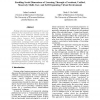Free Online Productivity Tools
i2Speak
i2Symbol
i2OCR
iTex2Img
iWeb2Print
iWeb2Shot
i2Type
iPdf2Split
iPdf2Merge
i2Bopomofo
i2Arabic
i2Style
i2Image
i2PDF
iLatex2Rtf
Sci2ools
C5
2004
IEEE
2004
IEEE
Enabling Social Dimensions of Learning through a Persistent, Unified, Massively Multi-User, and Self-Organizing Virtual Environm
Existing online learning experiences lack the social dimension that characterizes learning in the real world. This social dimension extends beyond the traditional classroom into the university's common areas where learners build knowledge and understanding through serendipitous and collaborative exchanges both within and across traditional subject area boundaries. A next generation Virtual Learning Environment (VLE) can address the limitations of current online systems by providing a richer social context for online learning. We describe the end-user properties of a highly-scalable selforganizing Croquet-based VLE that fosters dynamic group learning experiences and the development of communities of practice. This proposed VLE provides the capacity to merge the institutional infrastructure for academic computing, enterprise-level networks, Squeak/Croquet-based content authoring, and the educational principles of constructivist pedagogy.
| Added | 20 Aug 2010 |
| Updated | 20 Aug 2010 |
| Type | Conference |
| Year | 2004 |
| Where | C5 |
| Authors | Julian Lombardi, Mark P. McCahill |
Comments (0)

